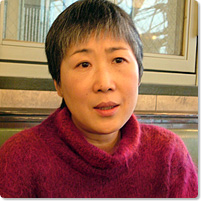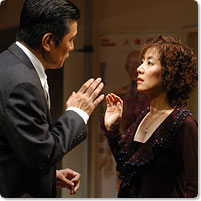Data
:
First Performance: 2005
Performance time: 1 hr. 50 min.
Acts / Scenes: 1 act
Cast: 5 (3 men, 2 women)
Ai Nagai
Utawasetai Otokotachi (Men Who Want Us to Sing)

Ai Nagai
Born in Tokyo in 1951, Ai Nagai is a playwright and director. She graduated from the Toho Gakuen College of Drama and Music with a major in theater. In 1981, Nagai formed the two-person theater company Nito with Shizuka Oishi. In 1992, the company was reorganized and renamed Nitosha, to serve as a production company for plays written and directed by Nagai. In her well-conceived works with their underlying social criticism, Nagai has continued to take up familiar, close-at hand subjects such as language, customs, gender, family and towns or problems deeply rooted in the subconscious to create plays that connect directly to real life with real-time immediacy. Nagai won the 1st Tsuruya Namboku Award for Ra-niku no Satsui in 1997 and the 44th Kishida Kunio Drama Award for Ani Kaeru in 1999. In 2000, she won the Drama Scenario Award of the 52nd Yomiuri Literary Awards for Hagi-ke no Sanshimai (The Three Hagi Sisters). Since 2002, Nagai has served two terms as President of the Japan Playwrights Association. Nagai has also drawn attention abroad as one of Japan’s leading contemporary playwrights with drama readings of her works including Toki no Monooki (Time’s Storeroom) at the Bush Theatre in the UK and The Three Hagi Sisters at New York’s Japan Society. In 2007, there was also a drama reading of her play Katazuketai Onnatachi in the Japan-USA Playwright, Play Exchange Project organized by the Minneapolis (USA) Playwrights Center and other organizations, and in South Korea a reading of her play Konnichiwa Kasan .

The setting is the health room of a Tokyo municipal high school. It is an early spring day and just a few hours before the graduation ceremony is scheduled to take place. The school’s principal, Koreaki Yoda comes to get some medication for his hay fever and finds the new music teacher, Michiru Naka, resting there nearly half naked and wrapped in a comforter. Playing the accompaniment to the school song and the national anthem on the piano while the students sing at the graduation ceremony is the first big assignment she has received in her new job. But, while she was practicing she suddenly became dizzy, nearly fainted and spilled some coffee on her blouse, which the health teacher, Mayuko Anbe, is now drying for her. Michiru has finally gotten this job as a music teacher after giving up her dream of becoming a chanson singer.
The problem is that when she staggered in her dizzy spell, she lost her contact lenses too. She is not very a practiced pianist, and her reputation for mistakes at the piano has already won her the nickname “Miss Touch.” If she can’t see the music score, she is sure to make mistakes during the ceremony. When Michiru suggests that she could borrow the glasses of the nearsighted social studies teacher Norihiko Haijima, the principal and Anbe, who has brought her dried blouse, suddenly look perplexed for some reason.
It turns out that Haijima is oppose to mandatory singing of the national anthem and he is the one troublesome teacher at the school who is going to refuse to stand and sing the anthem. And in fact, when he is asked, he refused to lend his glasses for the playing of the national anthem.
The year before, this school had been reported on in the newspapers when four teachers and most of the graduating students refused to stand for the singing of the national anthem. The principal wants to follow the edicts of the Board of Education and get through this year’s graduation without any trouble.
At that point the English teacher, Manabu Katagiri comes rushing into the room in a fluster. He says that the teacher Sakuraba, who was supposed to continue to teach at the school after retirement age but had that offer retracted last year after opposing the singing of the anthem, was out at the school gate passing out leaflets encouraging people to oppose the singing of the anthem.
As Katagiri and the principal rush out, Haijima comes into the health room to see Michiru. When Michiru expresses her concern at what will happen to Haijima if he opposes the singing of the anthem again this year, Haijima responds by trying to convince her not to play the anthem, saying, “As one who dreamed of being a chanson singer, you must be someone with a freer soul than that.”
At that point the principal returns. Outside they hear the wailing of a police car siren. The police, who take away Sakuraba for handing out his leaflets.
At this point word comes that the students are also beginning to plan an opposition and refuse to stand for the anthem. They have become inspired by the idea that they have a right to “freedom of the soul” after reading what Haijima has written on his blackboard and the leaflets that Sakuraba has passed out. What was written on Sakuraba’s leaflets turns out to be an essay that the principal himself had written for a magazine some ten years earlier about “freedom of the soul.”
The principal stands alone on the roof of the school and lectures loftily about how mistaken his thoughts had been in his younger days. And he claims that if even one person refuses to stand for the anthem he will take responsibility for it by jumping off the roof.
When Michiru pleads with Haijima, telling him that if the principal jumps to his death it will be his fault, Haijima takes off his glasses, places them on the table and walks out of the health room.
Related Tags

